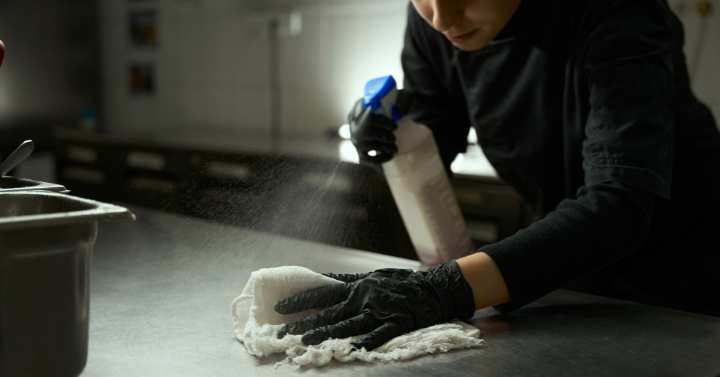Professional kitchen cleaning, also known as back-of-house cleaning, is essential for safe food preparation and for protecting the health of patrons, guests, and employees. As part of our ongoing analysis of this important market segment, Kline + Company recently conducted a survey of over 750 professional decision-makers responsible for kitchen cleanliness in commercial settings to understand their top concerns and priorities. Below, we spotlight five that are currently impacting commercial kitchen operations:
1. Prioritizing Food Safety Compliance to Protect Health and Reputation
Food safety compliance emerged as the top priority among respondents, with 75% rating it as extremely important. When food safety is overlooked, it can damage a restaurant’s reputation and consumer perceptions, and, more critically, foodborne illnesses can have serious public health consequences for guests, patrons, and employees. Ensuring consistent food safety is crucial for building customer trust and maintaining legal compliance within commercial kitchens.
2. Navigating Inflation’s Impact on Operating Costs
Inflation is a significant concern across the industry, with nearly half of survey respondents reporting negative impacts on their business. This sentiment is particularly strong among those in manufacturing (60%), K-12 schools (57%), restaurants (56%), retail (54%), and industrial facilities (50%). Rising labor costs, food expenses, and the risk of being unprofitable are pressing issues for facility managers, made even more challenging by minimum wage increases, which many respondents identified as an additional impact on their bottom line.
3. Addressing the Ongoing Labor Shortage
The labor shortage continues to persist and impact the industry, as a total of 41% of those surveyed find it more difficult to recruit and retain employees now than in the past, or that they are experiencing a labor shortage. The number of respondents who indicate labor shortage is a problem for them is even higher, with 62% of K-12 schools, 57% of government facilities, 50% of manufacturing facilities, 50% of industrial facilities, 46% of full-service restaurants, and 45% of retailers all indicating that this is an issue impacting their operations.
4. Managing Employee Training and Compliance Amid High Turnovers
With high turnover rates, training new hires on cleaning procedures and compliance is another pressing priority for end users. Consistently clean kitchens depend on well-trained staff who understand proper cleaning protocols to maintain facility standards. However, frequent employee turnover forces facility operators to dedicate substantial time to training staff, who may not stay long-term. As such, end users increasingly value support from cleaning suppliers, such as training tools, checklists, signage, and other efficiency aids, to streamline this essential task.
5. Embracing Green Cleaning and Sustainability Initiatives
Green cleaning and sustainability rank among the top priorities in professional kitchen cleaning, with 43% of respondents identifying green cleaning as a high-value focus, and 90% noting growth in sustainability initiatives at their facilities. These efforts span a range of practices, from reducing plastic waste and using greener chemistry products to conserving water and energy and opting for recycled-content packaging. By prioritizing sustainable solutions, facilities aim to meet both environmental goals and the growing expectations of conscious consumers.
As commercial kitchens face evolving demands, suppliers of foodservice cleaning products have a unique opportunity to turn these priorities into strategic growth areas. Kline’s Foodservice Cleaning Products USA study provides a comprehensive analysis of this market segment, focusing on key changes, challenges, and business opportunities. The report evaluates professional cleaning products used in back-of-house operations and includes insights into warewash machinery trends, end-user perceptions and usage, and dispensing methods. To learn more or discuss your specific business needs, contact us.

